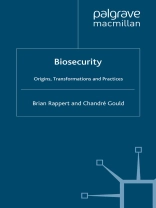This book explores the origins, interpretations and meanings of the term ‘biosecurity’. It brings together contributors on issues relating to the perceptions of the threat of biological weapons and how states are responding, or not, to the challenges posed by the potential of the products of the life sciences to be used for destructive purposes.
Tabela de Conteúdo
The Definitions, Uses and Implications of Biosecurity; B.Rappert PART I: BIOSECURITY IN THE INTERNATIONAL ARENA The Pre-History of Biosecurity: Strategies of Managing Risks to Collective Health; F.Lentzos The Rise of Biosecurity in International Arms Control; J.Revill& M.Dando Science of Mass Destruction: How Biosecurity Became an Issue for Academies of Science; K.van der Bruggen Biosecurity at the OECD; D.B.Sawaya Clarifying Biosecurity Terms: Recent Activities at the U.S. National Academies; B.Rusek PART II: IN COMPARISON The Importance of China as a Biosecurity Actor; M.Barr Dealing with the Dual-Use Aspects of Life Science Activities in Japan; K.Furukawa Biosecurity in New Zealand; T.Dunworth Biological Weapons Prevention in South Africa; C.Gould Biosecurity in Argentina; M.Lema Strategies to Prevent Bioterrorism: Biosecurity Policies in the United States and Germany; J.B.Tucker Conclusion; C.Gould
Sobre o autor
BRIAN RAPPERT is Associate Professor of Science, Technology and Public Affairs, Department of Sociology and Philosophy, University of Exeter, UK. His previous books include
Experimental Secrets;
Biotechnology, Security and the Search for Limits;
Controlling the Weapons of War;
Technology and Security (edited).
CHANDRÉ GOULD is Senior Researcher at the Institute for Security Studies, South Africa. Her previous books include
Secrets and Lies, Wouter Basson and the South African Chemical and Biological Weapons Programme;
Hide and Seek: Taking Account of Small Arms in Southern Africa (edited) and
Selling Sex in Cape Town: Sex Work and Human Trafficking in a South African City.












